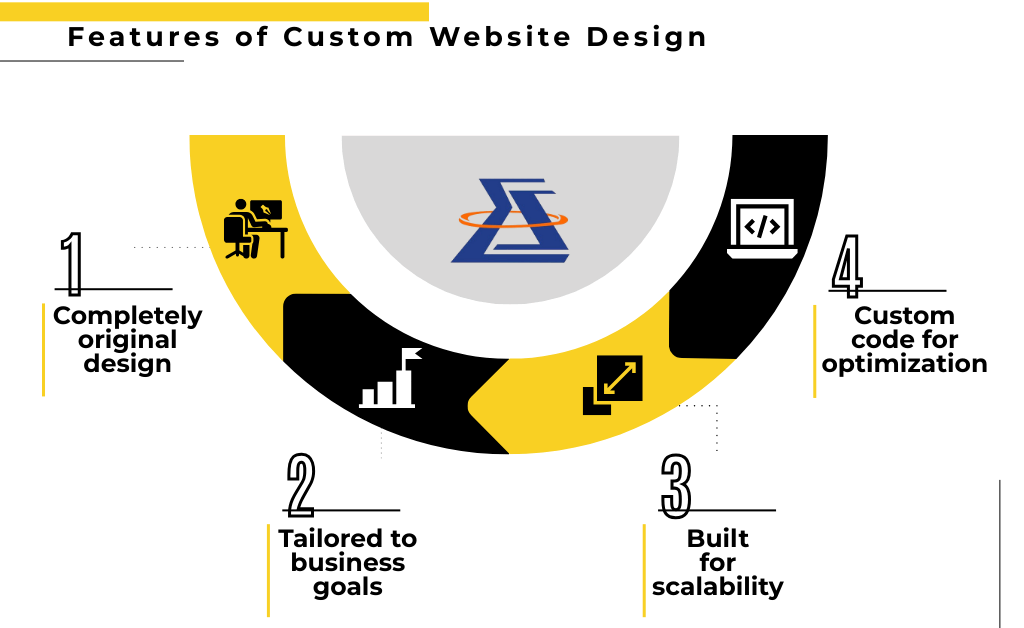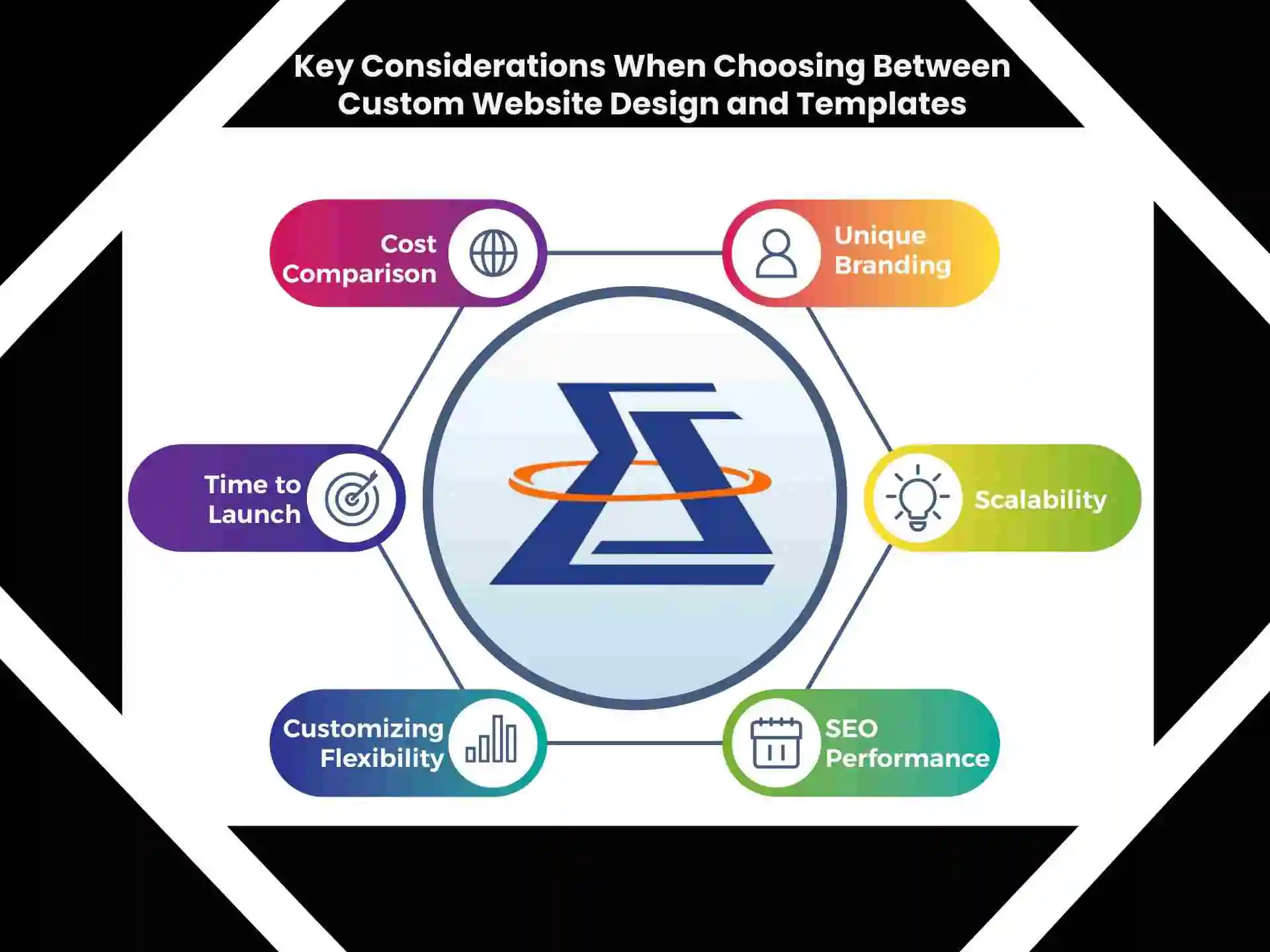views

Custom Website Design vs. Templates: Which is Best for Your Business?
Introduction
Is your website’s first impression the right one? The debate on custom website design vs. templates helps you determine the answer. The choice between a uniquely developed website design and the purchase of a template is often critical for modern-day digitization projects.
Your website is not a digital version of a paper brochure; it is your identity, a platform where you market yourself or your business, and a business asset that taps into your customers. Choose between a custom website and template wisely, as the design has the biggest impact on your success in the digital world. Determine the right design approach to use.
As is customary, we will discuss why design is integral to website development and what stays and leaves in a debate of custom website design vs. template for small businesses. We will also throw light on cost-effectiveness, scalability, and the custom website’s capability to rank better on SEPR.
What is Custom Website Design?
Definition:
Custom web design development entails designing a website from the ground up that will be specific to the needs, requirements, and style of the business. They may not be cheap initially, but custom website design benefits include sustainability, long-term cost-effectiveness, and scalability.
Features of Custom Design:

Completely original design
Having a website developed that is custom means that the layout and design are a distinguishing factor from others on the market and reflect the identity of your company.
Tailored to business goals and branding
All elements in custom site design are intended to meet the goal and objective of your business and to support your branding campaign.
Built for scalability and flexibility
Business people develop custom websites with future expansion for their business in mind, knowing that they can add new functions to the site later.
Custom code that optimizes performance and SEO
Segmentation coding allows for effective, efficient, and faster website performance, improved site speed, and Search Engine Result Pages (SERP) ranking.
Ideal Use Cases:
eCommerce giant: A big online store requires a powerful and extensible basis for the processing of great loads and the possible topological structure of products.
Healthcare provider: A hospital needs a secure, custom-built website to navigate under the rules of HIPAA and with portals for patients and integrated appointment scheduling.
Tech startup: A creative applications firm needs a contemporary website to represent its skill in the modern technology application and to pull in individuals to spend in the development firm.
What are Website Templates?
Definition:
Website templates are pre-made designs that have had their structures predetermined and then can be altered in limited ways. Among other website template benefits, they are easy to use and cheap for companies.
Features of Website Templates:
Pre-built designs with drag-and-drop functionality
There is a ready design with many styles and simple tools that enable anyone to make changes without programming.
Cost-effective and quick to launch
Pre-designed website templates are cheap and will take little time to develop, making them suitable for businesses that are in need of an online platform.
Limited customization compared to custom websites
Being customizable, templates are nevertheless restricted by their design and functional parameters, and therefore, template-based website limitations might influence a brand’s individuality adversely.
Ideal Use Cases:
Local bakery: If someone is running a small bakery, one doesn’t need a bulky and complex website but a website with product images, product descriptions, an online ordering feature, and contact information.
Freelance photographer: A budding freelance photographer would make it big with a decent yet captivating website that showcases her clicks and enables people to buy her pictures and receive service requests.
Fitness instructor: A personal trainer needs a basic site that provides information about classes and allows one to make a booking online.
Key Considerations When Choosing Between Custom Website Design and Templates

While choosing between custom websites vs templates, businesses should consider the following aspects: the amount of money that one would require, the time factor, branding issues, the custom web design advantages, and the goals and objectives of the business in the future.
Cost Comparison
Custom Website Design Cost:
Custom website design costs are a bit lavish compared to website templates. More features and more security means more cost. A decently built custom website can cost between $10000 and $100000.
Template Website Cost:
Templates come cheaper; they range from $20-$200 for the template itself, not including charges for customization and premium plugins.
Time to Launch
Custom Websites:
On average, it takes 2–6 months to design and build a new website if the company decides to use its unique structure.
Templates:
Many template-based sites can be up within days or weeks, which makes them suitable for trading needs an organization may require online.
Customization Flexibility
Custom Design:
Having custom websites can be used in various ways, and anyone can design them in the way they want and according to the business type.
Templates:
Templates offer little in terms of flexibility, meaning that you may be confined to coming up with a unique user experience.
Branding and Uniqueness
Custom Design:
Custom website development for companies brings the opportunity of having a standout web presence that accurately represents your brand and image.
Templates:
As for templates, it is true that everyone could have his or her own layouts and designs, as well as the end product might look very similar as many businesses could be applying the same layouts and designs.
Scalability
Custom Website Scalability:
The enterprise site is developed with the aim of ensuring that as the business grows, there are features that can easily be integrated into the site.
Template Scalability:
Website templates for small businesses may face some challenges of growth since they would have to be redesigned or rebuilt at a later date at an extra cost.
SEO and Performance
Custom Websites:
The answer may lie in the fact that custom-coded sites are cleaner and more optimized because they are coded that way, and hence, they are ranked better and are faster in loading than template-based sites.
Template Websites:
They may also contain extra or redundant code, which will only add more size to the site, demanding more efforts from SEO services and affecting its historical rankings.
When Should You Choose a Template Website?
Startups and Small Businesses:
Templates especially suit those planning to have a new or small business with little capital to invest or those who require an excellent-looking website in the shortest time possible.
Quick Launch Needs:
Website design for startups usually is built on a template when they are in a hurry to establish your website for a specific product or event.
Budget Constraints:
For website owners who have a strict budget to follow and need minimal customizations or functions, then templates are the perfect solution.
Real-World Case Studies: Custom Website Design vs. Templates
Case Study 1: Custom Design Success Story
A custom eCommerce website development may lead to a 40% uplift in conversion rates and a 25% increase in organic traffic within six months.
Case Study 2: Template Success for a Small Business
A local coffee shop developed its website from a template in order to get an online presence, and within the first three months, foot traffic increased by 15%.
Final Thoughts
Whether you are a small business or a corporate giant, Sigma Solve helps your business shine as digitization spreads to new horizons. We help you choose between a custom website and templates based on your business requirements.
Source: https://www.sigmasolve.com/custom-website-design-vs-templates-which-is-best-for-your-business/





















Comments
0 comment